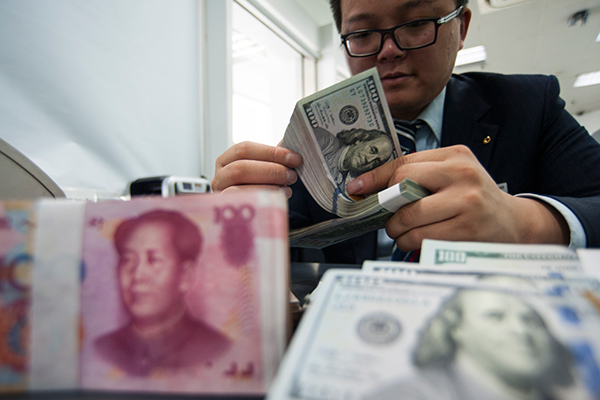Renminbi rises strongly against US dollar
 |
|
An employee at a bank counter in Nantong, Jiangsu province, counts renminbi and dollars. [Photo/China Daily] |
China's central bank raised the yuan's official central parity rate to 6.6102 per US dollar on Wednesday, the strongest level since mid-August 2016. Analysts, however, expect that the currency will not continue to rise as strongly in the coming months if the dollar rebounds.
The yuan's midpoint rate, set by the People's Bank of China and seen as a guide for market transactions, was 191 basis points higher than on Tuesday, when it already had risen by 60 basis points over Monday. One percentage point is 100 basis points.
The yuan also rose strongly against the dollar in offshore markets on Wednesday, hitting the highest level in 14 months. The yuan has risen by about 5 percent against the dollar since the start of the year.
"The strengthening is built on China's economic fundamentals," said Zhao Qingming, chief economist at the China Financial Futures Exchange. "The trend is clear that the Chinese economy has started to stabilize and improve while the US economic recovery seems to be rather fragile."
A weaker dollar is also a factor behind a rising yuan. The dollar index that tracks the greenback's value against six major currencies fell as low as 91.621 in intraday trading on Tuesday, its lowest since January 2015.
"Due to the weakening of the dollar, traders have opted to sell their dollar holdings recently, pushing up the yuan," said Xiao Lisheng, an economist at the Institute of World Economics and Politics of the Chinese Academy of Social Sciences.
"They previously may have wanted to sell dollars when the greenback rose. But the introduction of the 'countercyclical factor' to the yuan's pricing model against the dollar has pushed up market expectations for a stronger yuan, forcing those traders to settle their dollar holdings."
Monetary authorities said the factor has been introduced to moderate cyclical fluctuations driven by irrational sentiment in the foreign exchange market. The factor, introduced in May, takes greater account of overall economic conditions and how they influence the yuan.
Xiao said statistical modeling shows that the yuan's value has become increasingly sensitive to changes in the dollar. Therefore, if the dollar is near the bottom and starts to rise in coming months, the yuan may drop accordingly.
The dollar's recent weakening has gone beyond general market expectations, said Liu Dongliang, an analyst at China Merchants Bank. "The possibility is high, therefore, that the dollar may rebound in the coming months," he said, adding that the yuan may have bigger two-way fluctuations against the dollar.
- Resilience and risks of Chinese economy in transformation
- Economists see favorable outlook for RMB internationalization path
- IMF says Chinese RMB exchange rate in line with fundamentals
- Chinese yuan internationalization may regain momentum: bank
- Report: financial transaction function of RMB needs to be strengthened









